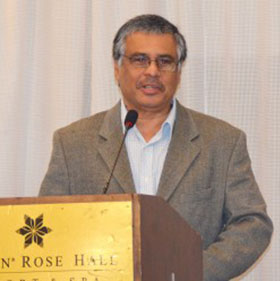MONTEGO BAY, Jamaica, Apr. 13, (CMC) – President of the Association of Caribbean Media Workers (ACM), Wesley Gibbings, says the current economic situation in the region will affect media houses throughout the Caribbean.
Delivering the public lecture of the Caribbean Institute of Media and Communication (CARIMAC) of the University of the West Indies (UWI) on Tuesday evening, Gibbings argued that “new business alliances, mergers and takeovers are clearly going to be the new norm, as the industry considers its several options in the face of threatened collapse in some instances.
“It might not entirely be that the sun is setting in the West Indies, even as it rises in the East but, that the orbit is being shaken and the rules of engagement are changing everywhere.”
Speaking on the topic, “Exploring the Caribbean Media Landscape: Mergers, Models and the Practice of Journalism”, the veteran journalist warned that the current state of economic flux throughout the region can also be expected to affect the financial bottom lines of media enterprises.
He noted, that in Trinidad and Tobago, the country’s main source of foreign income dropped by 70 per cent within the space of a year and, despite recent gains in Jamaica, “there remain areas of concern such as national debt, unemployment and the challenge of economic diversification”.
He told the audience that in some Eastern Caribbean countries, including Barbados, their economies can essentially be described as “moribund” and that “stress fractures” are appearing in these countries that were “considered, for a long time, to be among the more stable, well-structured economies of the region.
“This does not pronounce favourably on the future prospects for the media industry. In some instances, the survival game is well underway. Newsroom operations are shrinking, budgets are being cut, investments in new technology are being put on hold and the Big Bang of liberalisation in the 1980s and 90s is imploding.”
Gibbings said the merger involving the Jamaica Gleaner and RJR, which he described as “the largest in the history of the Commonwealth Caribbean,” does not appear to have been a function of generally poor states of affairs.
He quoted figures provided by media analyst, Dr. Marcia Forbes, which showed that radio and television command a significant portion of the audience market.
“The statistics for the Jamaica Gleaner are even more impressive with 77.3% of the Sunday readership and clear dominance on all other days of publication.
“The two companies have explained that the move had become necessary on account of what they describe as “challenging transitions which, in time, will see revenues increasingly dominated by digital revenue streams as media platforms converge.”
But Gibbings said that the assumption therefore is, that by combining resources, products and services, the companies will be able to achieve a number of important objectives, including digital transitioning, establishment of a larger resource base, the combining of unique expertise from each other’s core businesses, joint access to a vast storehouse of content and archives from two companies that include a 180-year-old newspaper and a radio network that was launched over 65 years ago.
He said the merger is likely to achieve some important objectives, the primary being vigilance over the public interest.
“This arises as a concern in the face of the contention that a business agreement, which merges the commercial activities of five radio frequencies, one free-to-air television station, three cable television channels, two newspapers and the very popular Go Jamaica online portal, can be perceived as representing a case of media concentration with all the accompanying threats to the desired goal of pluralistic media.
“As I have suggested before, I do not think this will be the case. But there is a debate that can be engaged on this issue.
“I would argue that in the current context, there is not likely to be such a threat, given what I have described as the unfolding media landscape region-wide in which traditional, mainstream media are yielding space to new forms of mass communication by a generation of media consumers with no particular allegiance to how things were done in the past.”
But the ACM President said that he, however, believes “that the validating role of traditional media will remain for the time being and that people will continue to respond to the official stamp of the morning newspaper or the evening newscast.
“It is also my view that the threat of so-called robo-journalism, involving technologically ubiquitous methods of acquiring and disseminating news and information, secure from the rigours of professional newsgathering, will not be a pervasive reality in the foreseeable future, for reasons outlined earlier,” Gibbings told his audience.
 Pride News Canada's Leader In African Canadian & Caribbean News, Views & Lifestyle
Pride News Canada's Leader In African Canadian & Caribbean News, Views & Lifestyle





